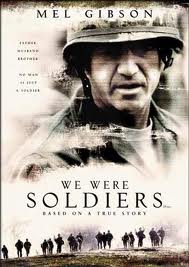
WE WERE SOLDIERS
US, 2002, 138 minutes, Colour.
Mel Gibson, Sam Elliott, Madeline Stowe, Greg Kinnear, Barry Pepper, Chris Klein, Keri Russell, John Hamm, Clark Gregg.
Directed by Randall Wallace.
We Were Soldiers comes rather late in the day in terms of films about the Vietnam war. Though there was an initial reluctance, by the end of the 1970s, and the fall of Saigon, the American industry made The Deer Hunter, Coming Home, Apocalypse Now. There was a reluctance to think about what became a very unpopular war, with the draft, and a defeat, and the loss of many American lives.
By 2002, it seemed a good thing to make a film like this. It is based on the memoir by the central character, Hal Moore, played with great intensity by Mel Gibson, almost icon-like, a fierce leader, loyal to troops, willing to lay down life for troops, yet a devoted husband and father, religiously devout, even to kneeling down and saying prayers.
The film opens with a prologue, the Vietnamese fighting the French and the defeats of 1954, leading ultimately to American intervention at the end of the key Kennedy era and through the presidency of Lyndon Johnson,. this film builds up to the first major battle between the Americans and the Vietnamese, the strategic preparations, for instance the establishing of an ambulance service to take the wounded from the battlefields by helicopter. It also shows the choosing of howl bought to be in charge, the store which lists of his World War II and Korea War veteran officer, Plumley, played with his staunch strength by Sam Elliott. There is the picking of the men, the training of the men, the preparation for war.
There are also family scenes, with Madeleine Stowe as Moore’s wife, and young newlyweds played by Chris Klein and Keri Russell, with Klein’s character questioning Moore about God’s plan and the sadness for Moore’s wife to have to deliver the news that her husband had died in action.
The battle scenes are vividly handled, quite intense, very much for the Americans but the film also shows a great number of sequences for the effect of the war on the Vietnamese themselves. And the film shows a great deal of loss of life on both sides.
The screenplay was written by Randall Wallace, who wrote Braveheart as well as Pearl Harbor and moved into direction with The Man in the Iron Mask, then this film. Later, he was to make Heaven is for Real.
1. A significant Vietnam war film? Not from the period when the films were made but rather the beginning of the 21st century? The status of Vietnam veterans at the time of the war and immediately afterwards? The changing perspective? The finale with Moore going to the Vietnam Memorial in Washington DC and the list of the names before the final credits?
2. The screenplay based on the book by Hal Moore? Authentic? About the military, about command, about training, about strategies and tactics, about loyalty to the men, about leadership, about action in battle, woundings and deaths, the aftermath of battles?
3. The importance of the war sequences, the film building up to them, the selection of the men, the training, the plans about the helicopters, going to Vietnam, the terrain, the firepower, the visuals of the fighting, shooting, explosions, fire from the air? The audience placed in the middle of the battles? The men, bravery, saving others, being shot, Joey, the photographer, the glimpses of his photos, his being put into action, his final words to Moore and reassuring him?
4. The strategists at the Pentagon, their plans, the helicopters, the choice of Moore, his reputation? His meeting with Snake, friendship, the discussions about the helicopters and the training? Later seeing Snake in action in Vietnam?
5. The men, the speeches, the presence of Plumley, his reputation, toughness, experience? The scenes of the training? The demands of the men?
6. War, at home, his wife, five children, kneeling for prayer, Julie being a Methodist, yet prayer for every intention? Love for his wife? His discussions with Jack, about God’s plan? Wearing the chain with his daughter’s name? Jack in command, his support of his men, his death, Moore taking the chain, delivered to Barbara? Her pregnancy, grief?
7. The scene with all the wives, their discussions, practicalities at the base? The woman misreading the laundry and the word, white The discovery of the racism? The response of the black woman – at the time of the Civil Rights movement?
8. The bulk of the film in Vietnam, the vividness of the war sequences? For the Americans? Desperation? Reinforcements? Airpower? The fire, the burning of the Americans, collateral damage, putting them in the helicopters?
9. The presentation of the Vietnamese, in battle, their strategies, weaponry, shooting, offices, being defeated by American weapons, the final defeat, the officer, the tunnels, the Vietnamese document, the photo of the wife? The glimpse of her at home and the news of the deaths?
10. The role of the photographer, in action, having to take up or weapon? The end of the battle, the swarm of journalists and their approaching Moore, his lack of answers for them?
11. The significance of this film in the American consciousness – and its release only months after 9/11?